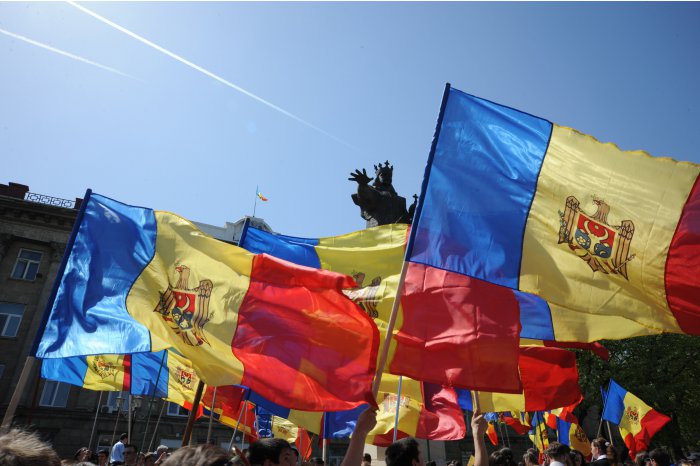27 April 1990. Moldova's parliament adopts state flag - Tricolour
15:36 | 26.04.2021 Category:
Ten days of fierce fights in the first democratically elected parliament did not yield palpable results. The efficiency of the legislative creation was seriously jeopardized by the resistance of the conservative lawmakers, which were willing to preserve the old Soviet regime intact.
Nevertheless, on 25 April, the parliament adopted the agenda of works for 27 April and everybody understood that this would be a decisive day. Only three issues were on the agenda: the switch to the local hour, election of the parliament speaker and the approval of the state flag.
There were not quite many discussions on the first issue and Moldova after 49 years returned to the central European hour. The election of Mircea Snegur was not at all an easy case, as the party of communists, in a strong decline, was insistently promoting its leader, Petru Lucinschi. Beyond the agitation, backstage games and speculations, Mircea Snegur won with a comfortable score. The big fight was to be given for the Tricolour.
The Tricolour did not appear accidentally at the actions within the national liberation movement. Those who deeply know the history know these colours – blue, yellow and red – were characteristic for our nation during its millennium-old history. When the Country Council was to vote the flag of the Moldovan Democratic Republic in 1917, the great heraldry specialist with the European stature and the great patriot, Paul Gore, explained this incontestable truth as good as possible.
On 27 April 1990, the role of Gore was played by professor Alexandru Mosanu. He spoke inspired about the historic truth, about the valences of the national colours, about the massive support enjoyed by the tricolor among the citizens and the lack of alternatives. The atmosphere was becoming hotter and hotter in the session hall. Meanwhile, the space in the centre of Chisinau was overcrowded with people who were emotionally waiting for the decision. The three colours were emotionally strongly connected with the sense of the national movement, so that a refusal to approve them could have had unpredictable consequences. Almost each third of the hundreds of thousands of citizens present on streets had mobile radio apparatus with them and there was a full silence during the discussions. Everybody was listening for the broadcasting.
After two hours of discussions on the report of Alexandru Mosanu, the draft on amendment of the Constitution was put to vote. A huge pressure was in the session hall too. Everybody understood that two thirds of the votes were needed for the change of the Constitution and approval of the Tricolour. At a certain time, the Transnistrian delegation walked out of the session hall through the back door.
The electronic vote proved a quasi-total support for the Tricolour. Almost 290 MPs voted for, 22 voted against and 14 abstained from voting. The enthusiasm was indescribable both in the session hall and on streets. The MPs, overwhelmed by emotions, could no longer stay in the hall for other discussions and walked out to people. There was a great holiday in Moldova’s villages and cities. The Tricolor, even till its approval, was raised on the buildings of the Councils of all levels, on the highest pillars, on buildings and on people’s homes.
The Tricolour was not recognized in Moldova’s eastern districts. On 1 May, a big people’s rally took place in Chisinau, during which the Tricolour was dominating the event. At the same time, everything remained as in old times in Tiraspol and other Transnistrian cities. The flag of the USSR and the one of the Soviet Moldova left no room for interpretations and opinions. When the green-red demonstration was over, a vehicle passed in front of the participants in the event, through the window of which the Tricolour was unfurling. These were the member of the Ilascu group, who did not have fear and proved devotion to the national colours.
Thirty one years have passed since the Tricolour became the symbol of our dignity. Some politicians tried to come up with other proposals, in order to cancel an unprecedented effort of a generation to bring the flag to its home. Yet, all these attempts were in vain, as the collective soul of a nation is unfurling in its flag.
Chisinau, 26 April /MOLDPRES/.

